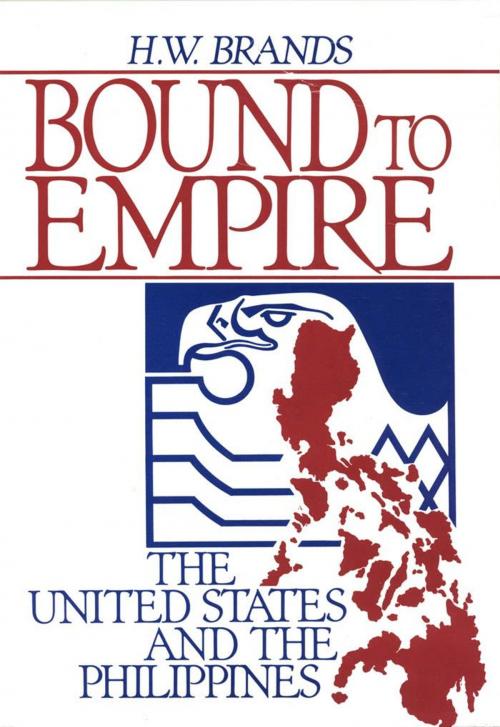| Author: | H. W. Brands | ISBN: | 9780199879328 |
| Publisher: | Oxford University Press, USA | Publication: | September 17, 1992 |
| Imprint: | Oxford University Press, USA | Language: | English |
| Author: | H. W. Brands |
| ISBN: | 9780199879328 |
| Publisher: | Oxford University Press, USA |
| Publication: | September 17, 1992 |
| Imprint: | Oxford University Press, USA |
| Language: | English |
From the day Commodore Dewey's battleships destroyed the Spanish fleet at Manila to the closing of the Subic Bay naval base in 1992 America and the Philippines have shared a long and tangled history. It has been a century of war and colonialism earnest reforms and blatant corruption diplomatic maneuvering and political intrigue an era colored by dramatic events and striking personalities. In Bound to Empire acclaimed historian H.W. Brands gives us a brilliant account of the American involvement in the Philippines in a sweeping narrative filled with analytical insight. Ranging from the Spanish-American War to the fall of Ferdinand Marcos and beyond Brands deftly weaves together the histories of both nations as he assesses America's great experiment with empire. He leaps from the turbulent American scene in the 1890s--the labor unrest the panic of 1893 the emergence of Progressivism the growing tension with Spain--to the shores of the newly acquired colony: Dewey's conquest of Manila the vicious war against the Philippine insurgents and the founding of American civilian rule. As Brands takes us through the following century describing the efforts to "civilize" the Filipinos the shaping of Philippine political practices the impact of General MacArthur and World War II and the Cold War he provides fascinating insight into the forces and institutions that made American rule what it was and the Republic of the Philippines what it is today. He uncovers the origins of the corruption and nepotism of post-independence Philippine politics as well as the ambivalence of American rule in which liberal principles of self-determination clashed with the desire for empire and a preoccupation first with Japan and later with communism. The book comes right up to the present day with an incisive account of the rise and fall of Ferdinand Marcos the accession (and subsequent troubles) of Corazon Aquino the Communist guerrilla insurgency and the debate over the American military bases. "Damn the Americans!" Manuel Quezon once said. "Why don't they tyrannize us more?" Indeed as Brands writes American rule in the Philippines was more benign than that of any other colonial power in the Pacific region. Yet it failed to foster a genuine democracy. This fascinating book explains why in a perceptive account of a century of empire and its aftermath.
From the day Commodore Dewey's battleships destroyed the Spanish fleet at Manila to the closing of the Subic Bay naval base in 1992 America and the Philippines have shared a long and tangled history. It has been a century of war and colonialism earnest reforms and blatant corruption diplomatic maneuvering and political intrigue an era colored by dramatic events and striking personalities. In Bound to Empire acclaimed historian H.W. Brands gives us a brilliant account of the American involvement in the Philippines in a sweeping narrative filled with analytical insight. Ranging from the Spanish-American War to the fall of Ferdinand Marcos and beyond Brands deftly weaves together the histories of both nations as he assesses America's great experiment with empire. He leaps from the turbulent American scene in the 1890s--the labor unrest the panic of 1893 the emergence of Progressivism the growing tension with Spain--to the shores of the newly acquired colony: Dewey's conquest of Manila the vicious war against the Philippine insurgents and the founding of American civilian rule. As Brands takes us through the following century describing the efforts to "civilize" the Filipinos the shaping of Philippine political practices the impact of General MacArthur and World War II and the Cold War he provides fascinating insight into the forces and institutions that made American rule what it was and the Republic of the Philippines what it is today. He uncovers the origins of the corruption and nepotism of post-independence Philippine politics as well as the ambivalence of American rule in which liberal principles of self-determination clashed with the desire for empire and a preoccupation first with Japan and later with communism. The book comes right up to the present day with an incisive account of the rise and fall of Ferdinand Marcos the accession (and subsequent troubles) of Corazon Aquino the Communist guerrilla insurgency and the debate over the American military bases. "Damn the Americans!" Manuel Quezon once said. "Why don't they tyrannize us more?" Indeed as Brands writes American rule in the Philippines was more benign than that of any other colonial power in the Pacific region. Yet it failed to foster a genuine democracy. This fascinating book explains why in a perceptive account of a century of empire and its aftermath.















